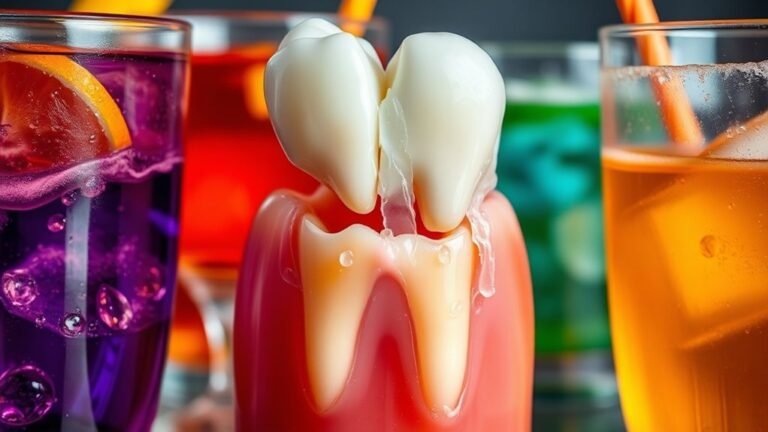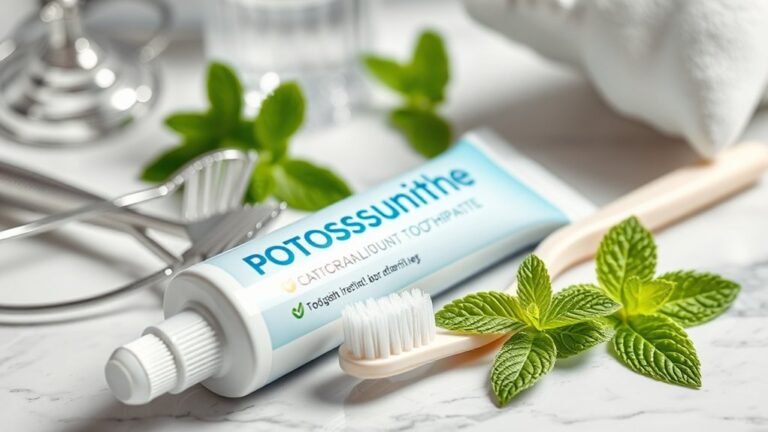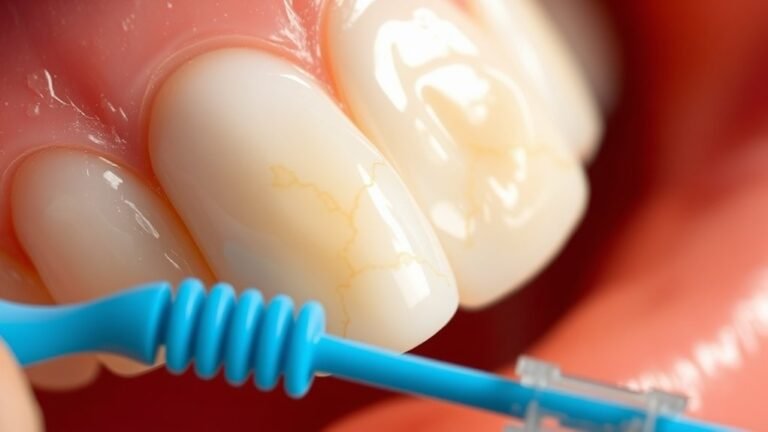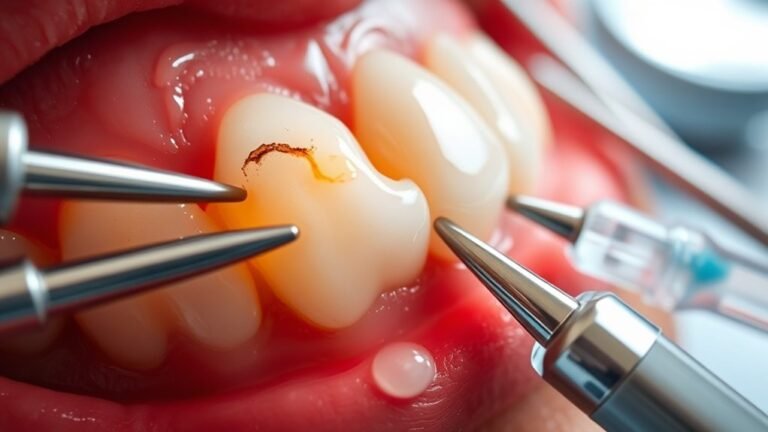Does Teeth Grinding Increase Enamel Wear and Cause Sensitivity
Yes, teeth grinding, or bruxism, greatly increases enamel wear, leading to greater tooth sensitivity and a higher risk of decay. The friction from grinding creates micro-abrasions on your enamel, which compromises its structure and can result in painful sensitivity to hot, cold, or sweet foods. This erosion doesn’t regenerate, making early intervention essential. If you’re looking to understand more about managing bruxism and protecting your enamel, there are several effective strategies and treatments available.
Key Takeaways
- Bruxism leads to involuntary teeth grinding, resulting in increased friction and micro-abrasions on tooth enamel.
- The friction from grinding compromises enamel structure, heightening the risk of enamel wear and sensitivity.
- Thinning enamel exposes underlying dentin, causing heightened sensitivity to hot, cold, or sweet foods.
- Chronic bruxism can accelerate dental issues, exacerbating enamel erosion and increasing the likelihood of tooth decay.
- Regular dental check-ups are essential for monitoring enamel wear and managing sensitivity associated with bruxism.
Understanding Bruxism: What It Is and Its Causes
Bruxism, or teeth grinding, occurs when you involuntarily clench or grind your teeth, often during sleep. This condition can arise from various factors, including stress, anxiety, or misaligned teeth. You might not even realize you’re doing it until you notice symptoms like tooth sensitivity or jaw pain. Stress management techniques, such as relaxation exercises, can help reduce the frequency of bruxism episodes. Additionally, certain medications or dental devices may be prescribed to alleviate the symptoms and protect your teeth. If you experience persistent tooth sensitivity, it’s vital to consult your dentist. They can assess the extent of your bruxism and recommend appropriate treatment options to safeguard your dental health. Understanding bruxism is essential for preventing long-term damage.
The Structure and Importance of Tooth Enamel
Tooth enamel is the hard, outer layer of your teeth, primarily composed of hydroxyapatite crystals. Its main function is to protect against decay and wear, playing a vital role in maintaining your overall oral health. Understanding its structure and importance can help you appreciate how essential it is to prevent enamel erosion from habits like teeth grinding.
Enamel Composition and Function
Although you may not think about it often, enamel plays an essential role in the overall health and function of your teeth. This hard, outer layer is primarily composed of hydroxyapatite, a crystalline structure that provides strength and protection. Enamel acts as a barrier against physical and chemical forces, preventing enamel wear caused by dietary acids and abrasive substances. When enamel wears down, it can lead to dentin exposure, the softer layer beneath, which can result in heightened sensitivity and increased risk of decay. Maintaining enamel integrity is vital; once damaged, it doesn’t regenerate. Regular dental care and minimizing habits like teeth grinding can help preserve enamel, safeguarding your dental health and comfort.
Role in Oral Health
Protecting your teeth involves understanding the role of enamel in oral health. Enamel, the outermost layer of your teeth, serves as a protective barrier against decay and sensitivity. When you experience enamel erosion, often exacerbated by factors like teeth grinding, your dental health can greatly decline. With diminished enamel, the underlying dentin becomes exposed, leading to increased sensitivity and a higher risk of cavities. Maintaining strong enamel is vital for overall oral health, as it helps withstand the daily wear from acidic foods and grinding forces. Regular dental check-ups, proper oral hygiene, and a balanced diet can help prevent enamel erosion and preserve your teeth’s integrity. Prioritizing enamel health guarantees your smile remains strong and resilient.
How Teeth Grinding Affects Enamel Integrity
Teeth grinding, or bruxism, leads to significant enamel erosion through mechanical wear and tear. This erosion can increase tooth sensitivity, making everyday activities uncomfortable. Understanding the mechanisms behind enamel wear and exploring prevention and treatment options is essential for maintaining oral health.
Enamel Erosion Mechanisms
When you grind your teeth, the repeated friction can lead to significant enamel erosion, compromising the integrity of your dental health. This mechanical abrasion affects the enamel’s structure, gradually wearing it down. The force generated during grinding creates micro-abrasions on the enamel surface, making it more susceptible to further damage. Over time, this erosion can result in thinner enamel, which may expose the underlying dentin and increase the risk of caries. Additionally, the constant grinding exacerbates wear patterns, leading to uneven surfaces and compromised occlusion. Addressing this issue is essential, as preserving your enamel integrity is critical for long-term dental health. Regular dental check-ups can help monitor enamel wear and provide strategies to mitigate the effects of teeth grinding.
Impact on Tooth Sensitivity
Many people don’t realize that grinding your teeth can greatly increase tooth sensitivity. When you grind your teeth, the protective enamel wears down, exposing the underlying dentin. This exposure leads to heightened sensitivity, as the dentin contains tiny tubules that connect to nerve endings. As enamel integrity diminishes, you may experience discomfort when consuming hot, cold, or sweet foods. Proper dental care becomes essential in managing these effects; regular check-ups can help monitor enamel wear and sensitivity issues. If left untreated, increased tooth sensitivity can markedly impact your quality of life. By understanding the link between teeth grinding and sensitivity, you can take proactive steps to protect your enamel and maintain ideal dental health.
Prevention and Treatment Options
Grinding your teeth can markedly compromise enamel integrity, making prevention and treatment options essential for maintaining oral health. To mitigate the effects of bruxism, consider using custom mouthguards, which can provide a protective barrier during sleep. Additionally, incorporating sensitivity toothpaste can help alleviate discomfort by fortifying enamel and reducing sensitivity.
| Prevention Methods | Treatment Options |
|---|---|
| Use custom mouthguards | Sensitivity toothpaste |
| Manage stress levels | Regular dental check-ups |
| Avoid stimulants | Professional dental care |
| Practice relaxation techniques | Fluoride treatments |
Symptoms of Enamel Wear and Tooth Sensitivity
Although enamel wear can progress silently, several symptoms can alert you to potential issues. You might notice increased tooth sensitivity, especially when consuming hot, cold, or sweet foods. This sensitivity occurs because worn enamel exposes the underlying dentin, which is more sensitive to external stimuli. You may also see visible signs like discoloration, transparency at the edges of your teeth, or a rough texture. Additionally, you might experience discomfort when biting down, indicating deeper enamel wear. If you observe these symptoms, it’s essential to consult your dentist promptly. Early detection can help prevent further damage and reduce your tooth sensitivity, ensuring your dental health remains intact. Don’t ignore these signs—being proactive is key.
The Connection Between Bruxism and Tooth Sensitivity
When you clench or grind your teeth—known as bruxism—you may unknowingly contribute to increased tooth sensitivity. Teeth grinding exerts excessive pressure on your enamel, leading to microfractures and accelerated wear. As enamel thins, the underlying dentin becomes exposed, resulting in dentin hypersensitivity. This condition heightens your sensitivity to hot, cold, and sweet stimuli. The damage from bruxism doesn’t just affect enamel; it can lead to inflammation of the gums and even affect the pulp, further intensifying sensitivity. If you’re experiencing discomfort, addressing bruxism is vital. Consider consulting a dental professional to explore treatment options that can alleviate symptoms and protect your teeth from further wear and sensitivity. Managing bruxism can noticeably improve your oral health and comfort.
Risk Factors for Developing Bruxism
Stress and anxiety are significant contributors to bruxism, often leading you to clench or grind your teeth unconsciously. Additionally, sleep disorders, such as sleep apnea, can exacerbate this condition by disrupting your sleep cycle. Understanding these risk factors is essential for managing and preventing teeth grinding effectively.
Stress and Anxiety
While many factors contribute to the development of bruxism, stress and anxiety stand out as significant triggers. When you’re under stress, your body responds in ways that can lead to teeth grinding, ultimately affecting your oral hygiene and increasing tooth sensitivity.
Consider these points:
- Stress often leads to muscle tension in the jaw, heightening the likelihood of grinding.
- Anxiety can cause restless thoughts, which may manifest as nighttime clenching or grinding.
- Chronic stress may exacerbate existing dental issues, increasing enamel wear and sensitivity.
Sleep Disorders
Sleep disorders, such as insomnia and sleep apnea, can greatly increase your risk of developing bruxism. When you experience disrupted sleep, your body may respond with teeth grinding as a coping mechanism. This grinding can lead to increased tooth sensitivity, as enamel wear exposes the underlying dentin. Additionally, poor sleep can negatively impact your oral microbiome, creating an environment that fosters harmful bacteria. This imbalance may heighten the risk of dental issues, compounding the effects of bruxism. Addressing sleep disorders through proper treatment can dramatically reduce bruxism episodes, protecting your enamel and maintaining oral health. Prioritizing good sleep hygiene is essential for minimizing bruxism and its associated complications.
Preventive Measures to Protect Your Enamel
To effectively protect your enamel from the damaging effects of teeth grinding, incorporating preventive measures into your daily routine is essential. Here are some strategies to enhance tooth protection and maintain plaque control:
- Use a Night Guard: A custom-fitted night guard can reduce pressure on your teeth and prevent enamel wear during sleep.
- Maintain Oral Hygiene: Regular brushing and flossing help control plaque buildup, which can contribute to enamel erosion.
- Limit Acidic Foods: Reducing the intake of acidic beverages and foods can minimize enamel erosion and sensitivity.
Treatment Options for Bruxism
Teeth grinding, or bruxism, demands effective treatment options to alleviate its impact on your oral health. To manage tooth pain associated with bruxism, consider wearing a custom night guard. This device protects your teeth from grinding during sleep and reduces stress on the jaw. Additionally, practicing stress management techniques, such as meditation or yoga, can help minimize grinding episodes. Regular dental cleaning is essential, as it helps identify early signs of enamel wear and allows for timely intervention. In some cases, your dentist may recommend muscle relaxants or physical therapy to address jaw tension. By exploring these treatment options, you can protect your enamel and maintain a healthier smile.
The Role of Dental Professionals in Managing Bruxism
While many individuals may not realize it, dental professionals play an essential role in diagnosing and managing bruxism. Regular dental visits are vital, as they help identify the signs of teeth grinding early, preventing further complications like tooth decay. Here’s how dental professionals contribute:
Dental professionals are crucial in diagnosing bruxism, ensuring early intervention to prevent complications like tooth decay.
- Diagnosis: They assess your dental health and identify bruxism through clinical examinations.
- Treatment Plans: They create tailored strategies, including mouthguards to protect your teeth from grinding damage.
- Ongoing Monitoring: They monitor your oral health over time, adjusting treatments as necessary to minimize enamel wear.
Maintaining Overall Oral Health for Sensitive Teeth
Sensitive teeth can be a significant concern for those experiencing enamel wear, often exacerbated by bruxism. To maintain overall oral health, focus on enhancing saliva flow, which plays a vital role in neutralizing acids and remineralizing enamel. Staying hydrated and chewing sugar-free gum can stimulate saliva production effectively.
Additionally, prioritize gum health by practicing proper oral hygiene. Brush gently with a soft-bristled toothbrush and use fluoride toothpaste to strengthen enamel. Floss daily to remove plaque and food particles, ensuring healthy gums and reducing inflammation.
Regular dental check-ups are essential for monitoring both enamel wear and gum health. Your dentist can provide tailored advice and treatments to alleviate sensitivity and combat the effects of bruxism, ensuring your oral health remains intact.
Frequently Asked Questions
Can Teeth Grinding Occur During Sleep Only?
Teeth grinding can occur during sleep, but it’s not limited to that time. Many individuals grind their teeth while awake due to stress or concentration, which can also contribute to dental issues.
How Can I Diagnose if I Grind My Teeth?
Like shadows creeping in the night, you can diagnose teeth grinding by noticing jaw pain, headaches, or worn teeth. Keep a sleep diary and consult your dentist for a thorough examination and potential solutions.
Are There Specific Foods That Worsen Enamel Sensitivity?
Yes, acidic foods like citrus fruits, vinegar, and soda can worsen enamel sensitivity. Sugary foods also contribute to enamel erosion, so it’s best to limit your intake of these items for better dental health.
Is Teeth Grinding More Common in Certain Age Groups?
Teeth grinding often peaks in young adults and diminishes with age, yet it can affect individuals across all demographics. Stress and anxiety are common triggers, making awareness and management essential for everyone, regardless of age.
Can Stress Management Help Reduce Teeth Grinding?
Yes, managing stress can greatly reduce teeth grinding. By incorporating relaxation techniques like meditation or yoga, you can lower anxiety levels, thereby decreasing the likelihood of grinding, protecting your teeth from potential damage and discomfort.
Conclusion
As a final thought, teeth grinding can greatly increase enamel wear, leading to heightened sensitivity. Understanding bruxism and its effects on your enamel helps you take proactive steps for dental health. By recognizing the symptoms and seeking preventive measures, you can safeguard your teeth from further damage. Remember, consulting with a dental professional is essential in managing bruxism effectively. Prioritizing your oral health not only alleviates sensitivity but also enhances your overall well-being.






